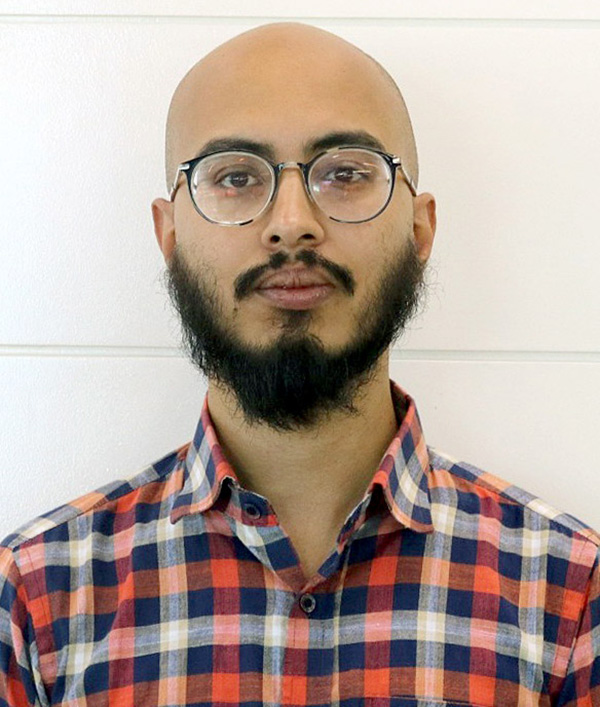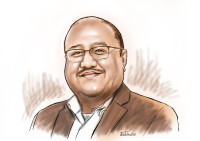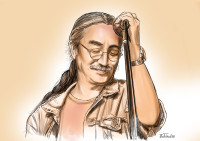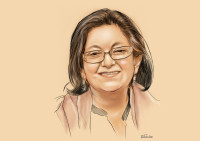Brunch with the Post
Bhojraj Pokharel: Honest people cannot contest direct elections anymore
The former election commissioner reminisces about the 2008 Constituent Assembly election and diagnoses the electoral system we practice now..jpg&w=900&height=601)
Pranaya SJB Rana
Pokharel is modest enough to attribute that historic election to his team at the Election Commission and the political parties, but the truth really is that if he hadn’t stood his ground, maintained strict neutrality and brought everyone together, the election might never have happened.
“The election was considered impossible but somehow, we got it done,” says Pokharel, a slight man, soft-spoken and polite.
We’re at the Dwarika’s Hotel in Battisputali because he wants to meet somewhere nice. He doesn’t know that the Post picks up the tab.
As we sit down to talk over coffee and pasta, we begin by starting at the beginning—how the Constituent Assembly election, which marked the end of the 10-year Maoist insurgency and the 250-year-old monarchy, came to be. After all, it was that election that made Pokharel’s reputation as a man of integrity.
“We initially had six months to do the election, with no legislation, no electoral system, no voter list and a country that had just emerged from a war. The people were terrorised and there was no access to large parts of the country. The country was not ready but we had to hold elections,” says Pokharel.
Pokharel was appointed chief election commissioner in October 2006 and the interim constitution had set June 7, 2007, as the date for the election. No one believed that the election would be held in June, or even at all. The Maoists, who had just emerged from the jungles, were suspicious, the political parties were wary and the palace had no desire to allow the election to be held. Pokharel tried to get all the parties together to draft an election law and work out the kinks, but it was soon clear that there was no way the June date would be met.
“I asked the parties many times to get everything ready but when that didn’t happen, in mid-April, I unilaterally announced that the elections would not be possible in June,” he says. “And that placed me in a very difficult position.”
The Maoists had long believed that the palace, which was down but not out, would never allow the election and when Pokharel announced its postponement to November, there was some suspicion that he was acting on behalf of the monarchy. But Pokharel persevered and managed to get everyone on board for November.
But then the Madhes Movement happened and the election had to be postponed again—to April 2008. By April, all the parties were on board, all the foreign observers had arrived, and it looked like the election would finally happen.
[That story is interesting but long and cannot be recounted in this space. For an in-depth account, consider Pokharel’s interview with Princeton University’s Woodrow Wilson School of Public and International Affairs.]
“The night before the election, near midnight, I received a call from a very sensitive actor,” recalls Pokharel. “I have not and will not name them but this person said that there was still time to postpone the election. ‘What will you gain from spilling the blood of thousands?’ the person said.”
There were already rumours that there would be violence on election day and after receiving that call, Pokharel couldn’t sleep all night.
“But the next morning, at around 5, I began to get reports that people had started lining up at the voting booths before dawn,” he says.
The Carter Center called the election “remarkable and relatively peaceful” and highlighted “the hard work of election officials”.
“Everyone was happy at that time, from GP Koirala to Prachanda to Madhav Nepal, as a seemingly impossible task had been concluded,” says Pokharel.
Pokharel came out of the election a winner himself. Many had noted the professional and impartial manner in which he had conducted himself.
“I tried to maintain neutrality in order to gain trust, and built ownership among stakeholders by bringing all of them together,” he explains. “We also tried to make the election as inclusive as possible, because a central part of the argument behind the war was that the country was not inclusive.”
Pokharel showed a keen understanding of the dynamics of the election as not just a logistical affair but a deeply political and symbolic one. The world was watching the Constituent Assembly election.
His exemplary work brought him appointments all over the world, from election to election, observing and advising. In 2008, he observed the election in Bangladesh and in 2011, he was part of a special team constituted by the UN Secretary-General to monitor the referendum in South Sudan. In 2015, he was a special advisor to the election commission in Myanmar as it held its first democratic election in over 15 years.
All of the experiences factor into a new book, Preventing Election Violence Through Diplomacy. The book, published by the United States Institute of Peace, looks at elections in Kenya, Nigeria and the Democratic Republic of the Congo, from 2006-2017, and offers recommendations.
Elections might be the mainstay of the democratic process but these are times when their very rationale is being called into question. Authoritarian leaders voted into power are busy hollowing out democracy. Donald Trump in the US, Narendra Modi in India, Rodrigo Dutuerte in the Philippines, Jair Bolsanaro in Brazil—all elected. Is this a problem with elections or the electorate?
“It is more about a gap between the delivery of leaders and the expectations of voters,” says Pokharel. “It is a crisis of leadership.”
In Nepal, KP Sharma Oli came to power on nationalist rhetoric, promising progress and prosperity to the people. And yet, there is not much to be seen.
“Oli tried to provide a kind of drive, but his focus is on the party and his faction rather than the nation,” says Pokharel. “He doesn’t see all Nepalis as his constituents.”
And that, says Pokharel, has been the problem with multi-party politics in the country. On the one hand, the people see the political party as the solution to all ills but the party, when it comes to power, doesn’t work for the people; it works for itself and worse, its own faction.
“The constitution gives the sovereign right to us, the citizens, but since we are not able to apply that right individually, we select representatives to work on our behalf,” says Pokharel. “But in reality, who exercises that right? Whether elected or unelected, a handful of leaders.”
Parliamentary politics has been held hostage by a dozen ageing political leaders who control their parties and by extension, the Parliament. In every instance, parliamentarians turn to the parties on how to vote and if they ever disagree, the whip comes into effect.
As an election expert, Pokharel knows where the rot lies. As the journalist Chandrakishore also diagnosed a few months ago, elections have become too expensive and they’re facilitating corruption.
“Honest people cannot contest direct elections anymore. The only people who can are criminals. Candidates are being bought and local leaders are selling votes to the highest bidder,” says Pokharel.
He relates an anecdote from his recent travels across Nepal. A popular local leader told him that just contesting the elections costs about Rs40-50 million and even then, victory is not certain. A better bet is to pay half that money to the party and get on the proportional representation list.
The Election Commission has placed a cap of Rs25 lakh on spending for parliamentary elections but Pokharel says a study he conducted on the electoral spending of five parties in Kathmandu found that the winners spent an average of Rs25 million and the losers spent around Rs15 million. And this was just the money spent openly.
“The Election Commission can take away their seat if it wants to, but it doesn't have the capacity to track financial spending nor the ability to regulate or enforce it,” says Pokharel.
One way to prevent this, or at least apply a level of transparency, would be for the state to consider funding political parties.
“Right now, the only way for political parties to raise funds is through donations, which leads to relations with businesses and criminals,” says Pokharel. “There's no real evidence that state funding can reduce corruption but one advantage would be that at least the state auditor gets to look into party finances.”
The idea is really not so radical, as numerous countries already do it; although it does have its own pitfalls.
In the end, as we wrap up our hour-and-a-half conversation, Pokharel has sage advice.
“The system we have was produced by our leaders and if something damages the system, it won’t be other factors; it will be because of the leaders themselves,” he says. “Their actions will determine the future of the system and the constitution. They now need to make a decision about what is more important—themselves or the nation?”
Dwarika’s Hotel, Battisputali
ON THE MENU
CoffeeX2 Rs 540
Buckwheat pasta Rs 1,150
Rigatoni pesto Rs 900
Total Rs 3219




 18.37°C Kathmandu
18.37°C Kathmandu



.jpg&w=200&height=120)






